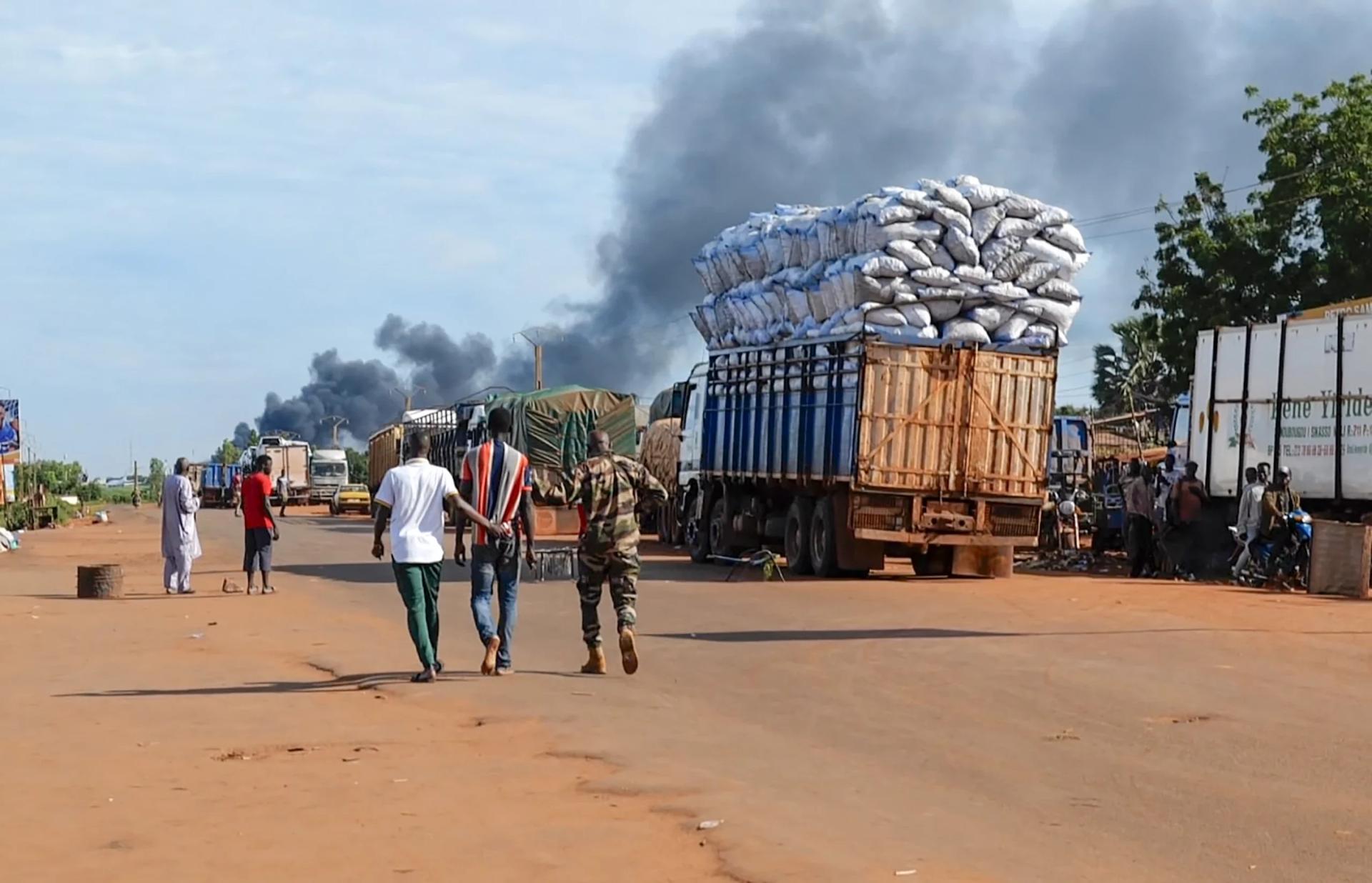YAOUNDÉ, Cameroon – In the wake of the devastating terrorist attacks in Bamako on September 17, Catholic Bishops in Mali have expressed profound sorrow and solidarity with the victims and their families.
The attacks – which targeted multiple locations including police and military installations, as well as the Bamako airport – claimed the lives of at least 77 people and injured over 255 others.
They were carried out by the Islamist militant group Jama’at Nusrat al-Islam wal-Muslimin (JNIM), affiliated with al-Qaeda.
The jihadists released a video now circulating on social media showing an al-Qaeda flag flying over a building at the airport. The video also shows one terrorist placing a burning rag in the engine of the presidential plane, others exploring the VIP terminal and others still firing shots as planes belonging to the United Nations Humanitarian Air Service (UNHAS) approach.
In a statement shortly after the attacks, JNIM claimed responsibility, saying that it had carried out “specific operation” against “the military airport and a gendarmerie training base.”
The country’s bishops’ conference condemned the attack, and expressed “great sadness at the terrorist attacks that have caused painful losses among the gendarmes and the military.”
The bishops signaled support for the Malian authorities “in this difficult period and thank the sacrifices of the armed forces and of the entire Malian people for their defense of sovereignty, national unity and territorial integrity.”
They called on the population to pray for peace, because “peace is a gift from God and the fruit of the work of men.”
The recent attacks have received broad-based condemnation, with the UN Security Council describing the attacks as “heinous.”
“The members of the Security Council expressed their deepest sympathy and condolences to the families of the victims and to the transitional Government and the people of Mali, and they wished a speedy and full recovery to those who were injured,” said the September 20 statement signed by UN Security Council President Samuel Žbogar.
“The members of the Security Council reaffirmed that terrorism in all its forms and manifestations constitutes one of the most serious threats to international peace and security,” the statement added, before underlining the need to bring “perpetrators, organizers, financiers and sponsors of these reprehensible acts of terrorism to justice.”
The attacks speak to the worsening security situation in Mali, and the larger Sahel region. They also come after the Alliance of Sahel States (AES/ASS) – a confederation formed between Mali, Niger, and Burkina Faso – accused Ukraine of supporting terrorism in the region.
“As such, they denounced Ukraine’s active and publicly claimed support for the terrorist groups who attacked the town of Tinzawatene in Mali,” said a statement released on Monday as the AES commemorated its first anniversary.
Ukraine has denied the accusations. Still, the apparent advance of the jihadists toward the South is a clear pointer that the AES are finding it hard to deal with terrorism after breaking ranks with their Western, particularly French backers, in favor of Russia.
Mali broke its military accords with France on May 2, 2022, complaining that the French troops had carried out “flagrant violations” of its national sovereignty.
“For some time now, the government of the Republic of Mali notes with regret a profound deterioration in military cooperation with France,” spokesman Colonel Abdoulaye Maiga said in a televised statement at the time. Niger and Burkina Faso also broke ranks with France.
Mohamed Kheir Omer, a Norway based researcher and writer, told Crux that by turning away from the French and embracing Russia, the Sahelian states were not necessarily showing love to Russia, but were rather frustrated with the West.
“I think Africans have become fed up with French policies in those former colonies. At independence, former France’s colonies in Africa were forced to sign humiliating agreements which effectively tied independence to continued economic and political dependence on France,” he said.
“Those agreements reserved strategic resources like hydrocarbons, uranium, and other minerals for France. Additionally, France gained privileged access to African markets, ensuring its companies had priority for exports and were exempt from customs duties,” he told Crux.
With Western intelligence unavailable and with Russia moving its defense system towards Ukraine, Mali, like other countries in the region, is now left at the mercy of the jihadists.
According to the Pontifical charity, Aid to the Church in Need, the jihadists are trying to impose Sharia law across the Sahel, and it’s a scenario that could spell doom for Christians in the region.
For Catholics in Mali, all that’s left is to pray for a return to peace.













